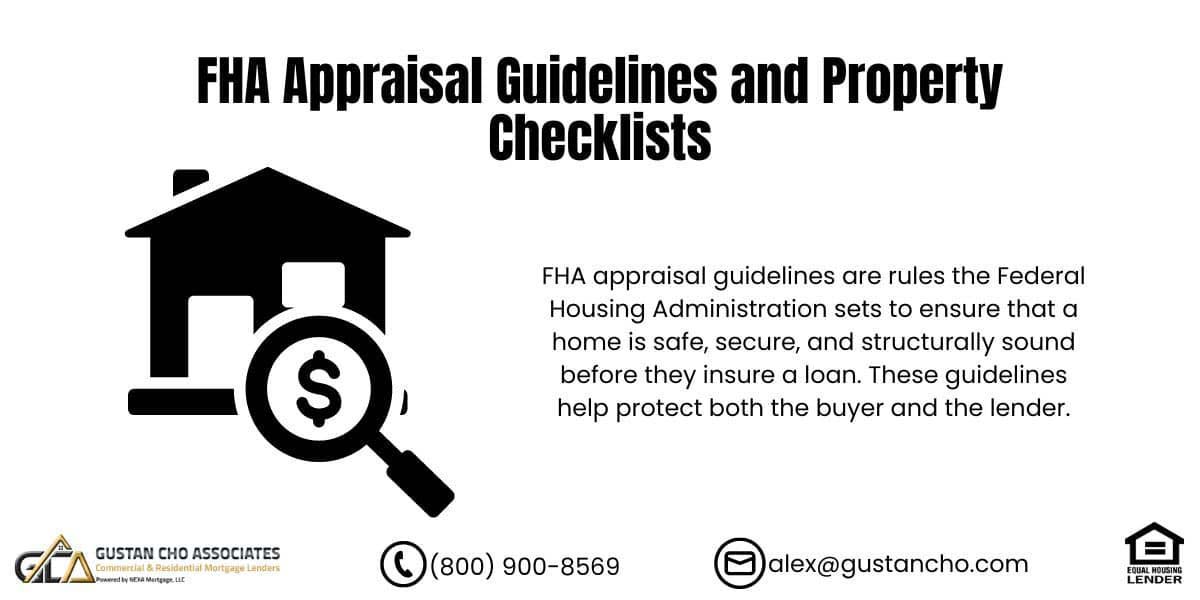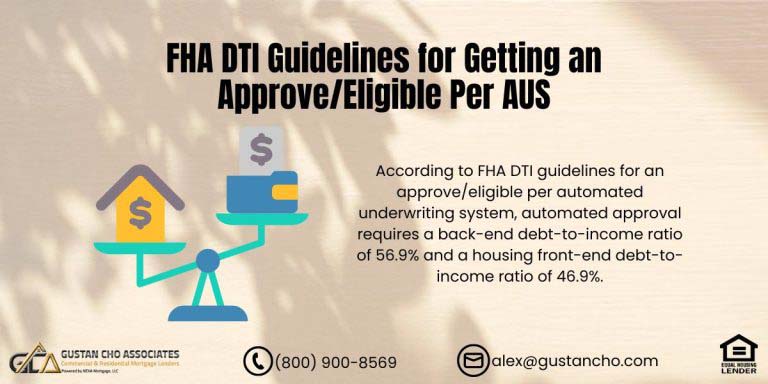In this guide, we’ll explain everything you need to know about FHA appraisal guidelines and what your home needs to check off the list for 2024 FHA loans. We’ll also examine how these FHA appraisal guidelines compare to regular loan appraisals and point out what’s different. This is made to make things clearer for those buying homes, selling them, and real estate agents, showing them what a home needs to get the thumbs up from an FHA appraisal.
Why FHA Appraisals Matter
Understanding FHA appraisal guidelines is key for anyone looking to buy a home with an FHA loan. These appraisals are crucial because they make sure the house you want to buy is safe, secure, and in decent condition. The Federal Housing Administration, or FHA, needs to be sure a home meets these basic standards before they agree to insure it.
Preparing for an FHA appraisal by familiarizing yourself with the guidelines can make a difference. It helps you know what inspectors are looking for and can save you time and money when buying a home. This way, you can fix potential issues before the inspection and avoid last-minute headaches.
What Does the Appraiser Look For During an FHA Appraisal?
When someone comes to check out a house for an FHA loan, they used to have a lot of strict rules to follow, more so than usual loans. But lately, these rules aren’t as tough. Even though there are still many boxes to tick during these checks, the main goal is to ensure the house is safe and livable.
Thinking about buying a home with an FHA loan?
Make sure your property meets FHA appraisal standards! Get started today with a free quote—apply now and see if you qualify!
Basic Minimum FHA Appraisal Guidelines
FHA appraisal guidelines are just rules to check if a house is in good shape, safe to live in, and has no big problems. When someone looks at a house for FHA, they look for three things:
- Safety: The house needs to be safe. So, things like broken windows, hanging wires, or flaking paint need to be fixed before you can get the loan.
- Security: The house has to be secure, meaning it shouldn’t be easy for someone to break in, and it can’t have parts that are about to fall apart and be a danger to people living there.
- Soundness: The house also needs to be solid. The foundation has no big issues, the roof can’t cave in, or anything else that could make it unsafe to live in.
Health and Safety Standards
When you’re taking a loan for a house, the FHA has rules to ensure your home is safe. Here’s what they look for:
- Mold or Asbestos: Your house can’t have mold, asbestos, or other bad stuff that can make you sick.
- Working Electricity and Pipes: All your lights, outlets, and plumbing have to work properly without any dangers.
- Heating and Cooling Must Work: Your heater and air conditioner must work right to keep you comfortable.
If the person checking your house finds any problems, you’ll have to fix them before the loan can go through.
Detailed FHA Appraisal Checklist
Here’s a simpler version of what FHA appraisers check when they visit a house. This list can help you get ready for when an appraiser comes. It’s all about making sure your place meets FHA appraisal guidelines.
Exterior Inspection
- Base: The bottom part of your house shouldn’t have big cracks, wet spots, or anything that weakens its strength.
- Roof: Your roof must be good for at least three more years. There should be no missing pieces or leaks.
- Walls Outside: These should be solid without big cracks, holes, or serious damage.
- Windows and Doors: Every window and door must work right, with no broken glass or messed-up frames.
- Ground Slope: Your yard should slope so water runs away from the house, not towards it.
Interior Inspection
- Basement and Under the House: These spots should be dry and clean, and you should be able to access them easily for checks and fixes.
- Roof Space: The area under the roof needs to be aired out well and free from dangerous stuff like open wires.
- Electric Stuff: The wiring and electric parts should be safe, nothing bare or broken.
- Water Pipes: The pipes and water system should work right, with no drips or damage from water.
- Heat and Cool: The system that makes your house warm or cool has to be working well.
Based on FHA appraisal guidelines, this list covers what to look out for to ensure your house is in good shape for an FHA loan.
Pedestrian and Vehicle Access
Every house needs a way for people to walk or drive up to it from a regular road or a private path. If the house is in a place owned by a group, like a homeowners association, they have to take care of the roads. Or, there might be a deal with the neighbors to look after it.
Separation from Adjoining Buildings
The FHA appraisal guidelines require a separate wall from top to bottom between your house and the next one. If it’s the outside wall, there should be enough room to make any repairs without trouble.
Proper Drainage
Your house must be set up so rainwater flows away and doesn’t pool around the foundation. This stops the base of your house from getting damaged and keeps mold from growing.
No Structural Damage
Your house can’t have any signs of poor construction or parts that are breaking down. This means no termite damage, water damage, or parts that haven’t been looked after. The roof is especially important – it should be in good shape, have no missing tiles, and not leak, with at least three years left in it.
Living Quarters and Functional Spaces
According to FHA appraisal guidelines, your house should have enough room for living comfortably. This means separate areas for sleeping, a full kitchen for cooking, and a place to hang out with family. The bathroom should work well, and all the systems, like wiring, pipes, and heating/cooling, need to be running smoothly.
Sanitary Facilities and HVAC
According to FHA appraisal guidelines, your house needs to have:
- A working system for getting rid of sewage
- A heating and air system that works well and can control temperature
- Hot water whenever you need it
- Clean, safe water to drink
- Everything that keeps the house running, like water, electricity, gas, and the sewage system, shouldn’t be mixed with those of any other house.
Free of Moisture and Mold
Following FHA appraisal guidelines, it’s important that:
- You can easily check on any crawl spaces under the house, which shouldn’t be filled with trash.
- Your home should be fine with dampness or mold growing anywhere.
Is your home FHA-ready? Don’t let appraisal issues delay your loan approval!
Apply now for a free consultation and ensure your home meets FHA appraisal standards before you buy
Transferring FHA Appraisals
One cool benefit of following FHA appraisal guidelines is that you can transfer your home’s FHA appraisal if you decide to switch lenders. This can be super handy if you need to change who is giving you your loan partway through the process. It’s like being able to take your progress with you, so you don’t have to start all over again.
Unfortunately, it doesn’t work the other way around. If you initially had a regular or conventional home appraisal, you can only convert it to something other than the FHA standards. If you switch to an FHA loan from a conventional loan, you’ll need a new appraisal under the FHA guidelines.
So, if you’re working with an FHA loan, it’s good to know that your appraisal can travel with you to a different lender if necessary. Remember, this flexibility is a unique perk to FHA loans, making them more adaptable in case your circumstances change.
Key Differences Between FHA and Conventional Appraisals
When comparing FHA appraisals to regular ones, there are a few big differences you should know about, especially when it comes to FHA appraisal guidelines:
- Health & Safety: FHA focuses on ensuring homes are safe and healthy to live in. They check for things like old lead paint, asbestos, or mold. These issues need to be fixed before you get the loan.
- Building Strength: FHA takes the condition of the house’s structure very seriously. If there are big cracks in the foundation, problems with the roof, or electrical issues, they must be fixed to pass an FHA appraisal.
- Getting to Your Home: According to FHA rules, your home must have a clear way to get to it from a main road. If not, there must be a legal agreement (easement) that lets you access the road.
- Home Condition: Your house needs to be ready to live in for an FHA loan. It shouldn’t need major repairs. Conventional loans might not be as strict about this.
These points highlight what makes FHA appraisals different. They focus on safety, structure, access, and the overall condition of the home.
Preparing for an FHA Appraisal
Getting your house ready for an FHA appraisal is important if you want your loan process to go smoothly. I’ve got some simple advice to help you prepare:
- Fix Any Safety Dangers: Make sure your home is safe. This means fixing any broken windows, sorting out any exposed wires, and dealing with mold or asbestos if they’re a problem.
- Look at the Structure: Check that the base of your house, the roof, and the walls are all okay. Fix any cracks, leaks, or other damage before the appraisal.
- Check Your Systems: Make sure your electrical system, plumbing, and heating and cooling work right. Repair any leaks or electrical issues.
- Clean up: Make sure areas like crawl spaces, basements, and attics are tidy and easy to access for the inspection.
- Handle Water the Right Way: Ensure the ground slopes away from your house so water doesn’t pool around it. Also, sort out any issues with how water drains to prevent damage.
Remembering these FHA appraisal guidelines helps make your home appraisal much smoother.
Addressing Common FHA Appraisal Issues and Finding Solutions
Understanding common FHA appraisal issues can help you address them before the inspection. Here are some common problems and solutions:
- Peeling Paint: This is a common issue, especially in older homes. Make sure to scrape and repaint any areas with peeling paint.
- Broken Windows: Replace any broken or cracked windows before the appraisal.
- Exposed Wiring: Fix any exposed wiring to ensure it is safe and up to code.
- Leaky Roof: Repair any leaks in the roof and replace missing shingles to ensure it meets FHA standards.
- Mold and Moisture: Address moisture issues and remove mold from the property. This may involve fixing leaks, improving ventilation, and using mold removal products.
FHA Appraisal Guidelines for Different Property Types
FHA appraisal guidelines differ depending on the type of place you’re looking to buy. Here’s a quick rundown of various homes:
- Single-Family Homes: These are the normal homes most people buy with FHA loans. The regular FHA appraisal guidelines we talked about apply here.
- Multi-Family Homes: If you’re looking at a place with 2-4 separate living spaces, each one needs to follow the FHA rules. That means every unit should have its own area to live, cook, and bathe.
- Condos and Townhomes: If you want to buy one of these, make sure the whole building is approved by the FHA. The individual unit has to meet the FHA’s standards, and the building should be in good standing with the FHA.
FHA Appraisal Re-Inspection
When an FHA appraisal first happens, it might find some problems that need fixing. Here’s what to do next according to FHA appraisal guidelines:
- Fix Things Up: Address all the problems the appraiser found. This could mean fixing broken things, eliminating dangers, or just making your place better.
- Schedule a Re-Inspection: After everything’s fixed, get in touch with the appraiser to come check things out again.
- The Second Check: The appraiser will check to see if you’ve sorted out all the issues. If so, they’ll update the report, and your loan process can continue.
Final Thoughts on FHA Appraisal Guidelines
Understanding FHA appraisal guidelines is very important for anyone buying or selling a home with an FHA loan. By knowing what to expect and preparing accordingly, you can help ensure a smooth and successful appraisal process.
If you have any questions or need assistance with FHA appraisals, feel free to contact a loan officer. They can provide guidance and support to help you navigate the appraisal process and secure your FHA loan.
For more information and to apply for an FHA loan, visit our website or contact us today.
FAQs: FHA Appraisal Guidelines and Property Checklists
- 1. What are FHA appraisal guidelines? FHA appraisal guidelines are rules the Federal Housing Administration sets to ensure that a home is safe, secure, and structurally sound before they insure a loan. These guidelines help protect both the buyer and the lender.
- 2. Why are FHA appraisal guidelines important? FHA appraisal guidelines are important because they make sure the home you want to buy meets certain standards for safety and livability. This ensures the property is a good investment and safe for you.
- 3. What does an appraiser check during an FHA appraisal? An appraiser will inspect the property for safety hazards, structural issues, and general livability. This includes examining the foundation, roof, windows, electrical systems, plumbing, and more to ensure they meet FHA appraisal guidelines.
- 4. How are FHA appraisal guidelines different from conventional loan appraisals? FHA appraisal guidelines are generally more stringent, focusing on health and safety issues, structural integrity, and access. Conventional appraisals might be more relaxed on these points.
- 5. What happens if a home doesn’t meet FHA appraisal guidelines? If a home doesn’t meet FHA appraisal guidelines, the buyer can often make the necessary repairs and schedule a re-inspection. The loan can only proceed once the home meets all the required standards.
- 6. Can an FHA appraisal be transferred to another lender? Yes, an FHA appraisal can be transferred to another lender. This is a benefit of FHA loans, making it easier if you need to switch lenders during the process, as long as the appraisal meets the FHA guidelines.
- 7. Do FHA appraisal guidelines require the home to be mold-free and asbestos-free? According to FHA appraisal guidelines, the home must be free of hazardous materials like mold and asbestos. These issues must be addressed before the loan can be approved.
- 8. What should I do to prepare my home for an FHA appraisal? To prepare your home, fix any safety hazards, ensure all systems (electrical, plumbing, HVAC) are working properly, repair structural issues, and make sure the home is generally clean and accessible for the appraiser.
- 9. How long does an FHA appraisal last? An FHA appraisal is generally valid for 120 days. If the loan process is delayed, you may need to get an updated appraisal to ensure it still meets FHA appraisal guidelines.
- 10. What types of properties are eligible for FHA appraisals? Single-family homes, multi-family homes (2-4 units), condos, and townhomes can all be eligible for FHA appraisals, provided they meet FHA appraisal guidelines. Each property type must meet specific standards set by the FHA.
If you have any questions about FHA Appraisal Guidelines, please contact us at 800-900-8569. Text us for a faster response. Or email us at alex@gustancho.com. The team at Gustan Cho Associates is available 7 days a week, on evenings, weekends, and holidays.
This blog about FHA Appraisal Guidelines and Property Checklists was updated on July 25th, 2024.










